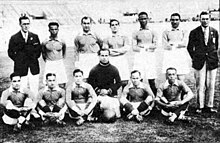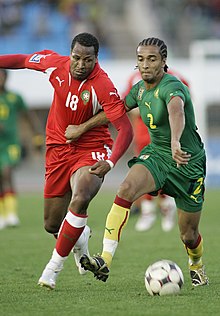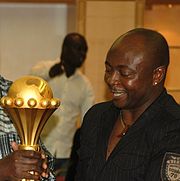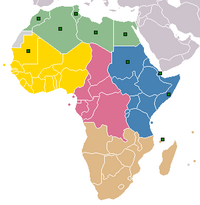Portal:Football in Africa
Introduction
Football is the most popular sport in Africa. Indeed, football is probably the most popular sport in every African country, although rugby and cricket are also very popular in South Africa. (Full article...)
This section may be unbalanced toward certain viewpoints. (October 2022) |

Selected article -
Football trafficking is the exploitation of young footballers in developing countries, particularly trafficking from South America and Africa into Europe and Asia. Human trafficking has been described as "quintessentially ... a part of football in Africa". Traffickers, representing themselves as "agents" of premier football leagues, prey on families desperate for a better life for their children, convincing the families to pay the traffickers "fees" to create the opportunity for the players to try out for European football teams, then absconding with the money and often leaving the young footballers stranded in Europe and other parts of the world. Agent fees in some places represent a family's entire savings. Some families sell their homes to raise the funds.
Claims of widespread trafficking have been disputed.
Selected biography -
Abedi Pele was one of the pioneers of African football in Europe. One of the first great African players to make an impact on European club football, he played for teams in Switzerland, Germany, Italy and most famously France where he was very instrumental in Marseille's prominence in the European Champions League during the early 1990s. Amongst his international accolades, he was often included in FIFA "All-Star" selections and captained the African All-Stars in their victory over their European counterparts in the 1997 Meridian Cup.
Selected image -
 |
A public bus in Nairobi, Kenya bearing the name of Spanish footballer Diego Costa, pictured on 17 August 2014. Football in Kenya is controlled by the Football Kenya Federation (FKF), and the nation became a member of FIFA in 1960, prior to their independence in 1963.
Subcategories
Related portals
More sports portals
WikiProjects
Related task forces and sub-projects
African football task force
WikiProject Africa • WikiProject Football
WikiProject Football task forces and sub-projects
 | |
| Wikipedia ads | file info – #250 |
Topics
Open tasks

- Expand stubs: Competitions in Africa • Organizations
- Expand club articles of teams from Africa.
- Expand biographies of Africans involved in football.
- Create: Requested articles • Most wanted football articles • Requested general football articles
- Add: Infoboxes • Images (General requests, Requested images of people)
- Review: articles currently under review
- Assess: Assessment requests • Assess an article
- Revert vandalism on this portal and on African football articles
- Assist in maintaining this portal and keeping its selected content up to date.
- WikiNews: Create and submit news stories about African football for Wikipedia's sister project WikiNews.
Associated Wikimedia
The following Wikimedia Foundation sister projects provide more on this subject:
-
Commons
Free media repository -
Wikibooks
Free textbooks and manuals -
Wikidata
Free knowledge base -
Wikinews
Free-content news -
Wikiquote
Collection of quotations -
Wikisource
Free-content library -
Wikiversity
Free learning tools -
Wiktionary
Dictionary and thesaurus
More portals
Sources

- ^ "The History Of Soccer In Africa". NPR.org. 2010-06-09. Retrieved 2016-03-31.
- ^ a b c Alegi, Peter (2010). African Soccerscapes. Ohio University Press. pp. 1–2. ISBN 9780896802780.
- ^ Frimpong, Enoch Darfah. "Ghana news: A world of superstition, frustration and disillusionment - Graphic Online". Retrieved 23 September 2017.
- ^ Lacey, Marc (8 August 2002). "Kangemi Journal; For Spellbinding Soccer, the Juju Man's on the Ball". The New York Times. NY Times. Retrieved 2016-03-31.
- ^ "World Cup Witchcraft: Africa Teams Turn to Magic for Aid". National Geographic. Archived from the original on July 10, 2006. Retrieved 2016-03-31.
- ^ Andy Mitten (September 2010). The Rough Guide to Cult Football. Rough Guides UK. ISBN 9781405387965. Retrieved 2016-04-02.
- ^ "African Nations Cup overshadowed by hocus pocus | Football". The Guardian. Retrieved 2016-04-09.
- ^ Kuper, Simon (2006). Soccer Against the Enemy: How the World's Most Popular Sport Starts and Stops Wars, Fuels Revolutions, and Keeps Dictators in Power. Nation Books. p. 123. ISBN 978-1-56025-878-0.

























